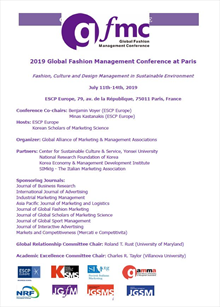간행물
Global Fashion Management Conference

- 발행기관 글로벌지식마케팅경영학회
- 자료유형 학술대회
- 간기 부정기
- ISSN 2288-825X (Print)
- 수록기간 2015 ~ 2024
- 주제분류 사회과학 > 경영학 사회과학 분류의 다른 간행물
- 십진분류KDC 325DDC 330
권호리스트/논문검색
2019 Global Fashion Management Conference at Paris (2019년 7월) 224건
41.
2019.07
구독 인증기관·개인회원 무료
Global Fashion Management Conference
2019 Global Fashion Management Conference at Paris
p.187
글로벌지식마케팅경영학회
42.
2019.07
구독 인증기관 무료, 개인회원 유료
Global Fashion Management Conference
2019 Global Fashion Management Conference at Paris
pp.188-191
글로벌지식마케팅경영학회
This working paper aims to conduct an empirical study to examine the relationship between industry performance and consumer well-being. We adopt the holistic view of consumer well-being which is measured using multiple dimensions (economic, socio-cultural variables). This paper proposes the model to test the effect on industry performance on well-being. Findings could benefit practitioners and academics.
3,000원
43.
2019.07
구독 인증기관 무료, 개인회원 유료
Global Fashion Management Conference
2019 Global Fashion Management Conference at Paris
pp.192-194
글로벌지식마케팅경영학회
3,000원
44.
2019.07
구독 인증기관·개인회원 무료
Global Fashion Management Conference
2019 Global Fashion Management Conference at Paris
pp.195-196
글로벌지식마케팅경영학회
45.
2019.07
구독 인증기관 무료, 개인회원 유료
Global Fashion Management Conference
2019 Global Fashion Management Conference at Paris
pp.197-199
글로벌지식마케팅경영학회
3,000원
46.
2019.07
구독 인증기관 무료, 개인회원 유료
Global Fashion Management Conference
2019 Global Fashion Management Conference at Paris
pp.200-203
글로벌지식마케팅경영학회
Do unhappy people drink alcohol or does alcohol make people unhappy? This research utilized cross-national data (Study 1) and a daily diary survey (Study 2) to investigate the link between alcohol consumption and happiness. In Study 1, at the national level, we examined the relation between alcohol consumption and happiness in 113 nations. The results revealed that there was an overall negative correlation between alcohol consumption and subjective well-being (SWB), positive affect, and generosity. In Study 2, at the individual level, we validated the findings of Study 1 by using the multilevel modeling method via the daily diary reports of Korean participants (N = 480). This method allowed us to investigate further whether alcohol consumption affected the level of happiness or whether happiness affected the level of alcohol consumption. The results showed that SWB increased the likelihood of alcohol consumption on that day, however, drinking alcohol decreases the level of SWB on the next day.
3,000원
47.
2019.07
구독 인증기관 무료, 개인회원 유료
Global Fashion Management Conference
2019 Global Fashion Management Conference at Paris
pp.204-206
글로벌지식마케팅경영학회
3,000원
48.
2019.07
구독 인증기관 무료, 개인회원 유료
Global Fashion Management Conference
2019 Global Fashion Management Conference at Paris
pp.207-212
글로벌지식마케팅경영학회
This study aimed to identify the effects of shopping environmental stimuli on Chinese consumers’ functional and symbolic value perceptions toward luxury lifestyle fashion stores. An enhanced S-O-R (stimulus-organism-response) model was used as the theoretical foundation. Significant relationships were identified between shopping environmental stimuli and the perceived values.
4,000원
49.
2019.07
구독 인증기관·개인회원 무료
Global Fashion Management Conference
2019 Global Fashion Management Conference at Paris
pp.213-214
글로벌지식마케팅경영학회
50.
2019.07
구독 인증기관 무료, 개인회원 유료
Global Fashion Management Conference
2019 Global Fashion Management Conference at Paris
pp.215-219
글로벌지식마케팅경영학회
4,000원
51.
2019.07
구독 인증기관 무료, 개인회원 유료
Global Fashion Management Conference
2019 Global Fashion Management Conference at Paris
pp.220-227
글로벌지식마케팅경영학회
Cortical activity was assessed in fashion-luxury consumers with a different sustainability orientation, in order to obtain insight on implicit dynamic towards eco-luxury products. Findings highlighted a strong emotional negative impact elicited by sustainability pictures implying a high engagement in luxury consumers when exposed to specific sensitive issues.
4,000원
52.
2019.07
구독 인증기관 무료, 개인회원 유료
Global Fashion Management Conference
2019 Global Fashion Management Conference at Paris
pp.228-233
글로벌지식마케팅경영학회
4,000원
53.
2019.07
구독 인증기관·개인회원 무료
Global Fashion Management Conference
2019 Global Fashion Management Conference at Paris
pp.234-235
글로벌지식마케팅경영학회
54.
2019.07
구독 인증기관·개인회원 무료
Global Fashion Management Conference
2019 Global Fashion Management Conference at Paris
pp.236-237
글로벌지식마케팅경영학회
55.
2019.07
구독 인증기관·개인회원 무료
Global Fashion Management Conference
2019 Global Fashion Management Conference at Paris
p.238
글로벌지식마케팅경영학회
56.
2019.07
구독 인증기관 무료, 개인회원 유료
Global Fashion Management Conference
2019 Global Fashion Management Conference at Paris
pp.239-259
글로벌지식마케팅경영학회
Collaborative apparel consumption is proposed as more sustainable alternative to conven-tional consumption. The purpose of this study is the exploration of consumers’ motives to participate in collaborative apparel consumption. Findings suggest that consumers’ inten-tion to participate in collaborative apparel consumption is mainly influenced by financial benefits, convenience and sustainability awareness.
5,700원
57.
2019.07
구독 인증기관 무료, 개인회원 유료
Global Fashion Management Conference
2019 Global Fashion Management Conference at Paris
pp.260-265
글로벌지식마케팅경영학회
The current study investigates how retailers deal with sustainability issues in different market fields with a specific focus on fashion industry. This work examines the last ten years of the scientific literature on sustainable retailing (SR), through a systematic literature review. 215 papers selected from the EBSCO database are analyzed, in order to develop an overview on the state of the art of research on SR. A comprehensive framework for a holistic definition of SR and for retailers’ practices related to sustainability is outlined. Future research directions on SR are provided.
4,000원
58.
2019.07
구독 인증기관·개인회원 무료
Global Fashion Management Conference
2019 Global Fashion Management Conference at Paris
p.266
글로벌지식마케팅경영학회
59.
2019.07
구독 인증기관·개인회원 무료
Global Fashion Management Conference
2019 Global Fashion Management Conference at Paris
p.267
글로벌지식마케팅경영학회

